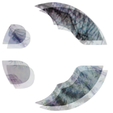|
On Wednesday 30th November 2016 I had the pleasure of joining peers Claudia Pasquero [cofounder, ecoLogicStudio/Urban Morphogenesis Lab, UCL/IaaC], Marco Poletto [cofounder, ecoLogicStudio, and Carnegie Mellon University], Ricardo de Ostos [partner, Naja & de Ostos], Emmanouil Zaroukas [The Bartlett], and Dr. Simon Park [University of Surrey], for the third in the BioSalon series.
Hosted at Ambika P3 gallery at the University of Westminster, the roundtable explored the intersection of biology, computing, and urban design. Poletto and Zaroukas presented ecoLogicStudio's experimental research in biological computing, which explores how microorganisms including slime mould, bacteria, fungi, and abiotic materials including salt can be used within urban design and architecture. Dr. Simon Park presented a selection of his collaborations with bio artists including Anna Dumitriu, including Bioluminescence: Bacterial Light Lab, whilst giving insights into the behaviours and processes of microorganisms. Titled 'Biome Shock: Anthropogenic vs. Ecological Intelligence', my presentation utilised Alvin Toffler's Future Shock as a tool for comparing and contrasting the difference in the former and latter. de Ostos presented some of his studios recent projects, explaining how the practice is exploring ecological systems as a means to inform architectural design decision-making. Infused with thoughts and commentary from audience members, the panel discussion centered on some of the philosophical and wider ideological issues to hand, including the impact of the inherent bias in human decision-making, and where intelligence in anthropogenic, biological, and ecological systems converge and diverge. BioSalon III was part of an ongoing series of events that bring together scientists, designers, artists, architects, and theorists, to converse wide-ranging aspects of biodesign, from scientific, technical and artistic potentialities, to ethics, philosophy, policy, and research practicalities. Collaborators include researchers and practioners from several universities including University of the Arts London, University College London, University of Greenwich, and the Royal College of Art.
0 Comments
Your comment will be posted after it is approved.
Leave a Reply. |
AuthorMelissa Sterry, PhD, chartered design scientist, systems theorist, biofuturist, and serial founder inc. Bionic City® Bionic CityAsking the question "how would nature design a city" since 2010.
Archives
October 2023
Categories#bionics
#biotech #biodesign #bioscience #biomimetics #biotechnology #bioengineering #bioinnovation #bioaesthetics #biorevolution #bioenterprise #biosystems #biocreative #biofuturism #biofutures #biocentric #biofacture #biotecture #biovation #biofiction #biourban #biocities #biolab #bioart #STEM
#STEAM #STEAMED #STEMcomms #STEAMcomms #STEAMEDcomms © Bioratorium Limited & Melissa Sterry
2021 All Rights Reserved |
 RSS Feed
RSS Feed

